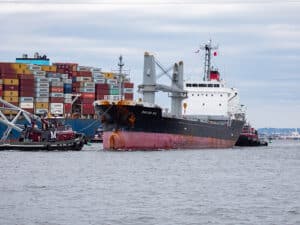
Houthi claim of hit on Ocean Jazz “patently false”
Written by Nick Blenkey
The Reuters news agency today reported the Houthis as saying that they had launched a missile attack on the Ocean Jazz, a 10,662 dwt U.S.-flagged heavlift carrier, in the Gulf of Aden. The Houthis did not say when or precisely where the attack took place or if any damage was caused.
This afternoon, U.S. Naval Forces Central Command/U.S. 5th Fleet said in a post on X:
“The Iranian-backed Houthi terrorists’ report of an alleged successful attack on M/V Ocean Jazz is patently false. NAVCENT has maintained constant communications with M/V Ocean Jazz throughout its safe transit.”
Ocean Jazz, which is operated by Seabulk Fleet Management of Tampa, Fla. (part of the SEACOR Holdings group], is reportedly under charter to the Navy’s Military Sea Lift Command.
The last Houthi attack on a U.S.-linked ship was on January 18, when U.S. Central Command reported that the “launched two anti-ship ballistic missiles at M/V Chem Ranger, a Marshall Island-flagged, U.S.-owned, Greek-operated tanker ship. The crew observed the missiles impact the water near the ship. There were no reported injuries or damage to the ship. The ship has continued underway.”
Meantime CENTCOM has continued its efforts to take out Houthi capabilities on land. On January 18, it said, “U.S. Central Command forces conducted strikes on two Houthi anti-ship missiles that were aimed into the Southern Red Sea and were prepared to launch. U.S. forces identified the missiles in Houthi-controlled areas of Yemen at approximately 3:40 p.m. (Sanaa time) and determined they were an imminent threat to merchant vessels and U.S. Navy ships in the region. U.S. forces subsequently struck and destroyed the missiles in self-defense.”
Then, on January 20, “at approximately 4 a.m. (Sanaa time), U.S. Central Command forces conducted airstrikes against a Houthi anti-ship missile that was aimed into the Gulf of Aden and was prepared to launch. U.S. forces determined the missile presented a threat to merchant vessels and U.S. Navy ships in the region, and subsequently struck and destroyed the missile in self-defense. This action will make international waters safer and more secure for U.S. Navy and merchant vessels.”
DOT BRIEFS ON SUPPLY CHAIN IMPACTS
All of this is continuing to impact the global supply chain in multiple ways as more shipowners avoid the Red Sea and, last Thursday, as part of the U.S. Department of Transportation’s Office of Multimodal Freight Infrastructure and Policy’s ongoing coordination efforts amid attacks in the Red Sea, DOT convened stakeholders from the federal government as well as the shipping, trucking, rail, port, and other supply chain industries to provide updates and to hear concerns from the industry about mariner safety and supply chain impacts.
DOT says it has been in frequent communication with freight industry partners since December regarding the impacts of the situation in the Red Sea, and that Thursday’s briefing was part of a regular series of stakeholder listening sessions it has been hosting on the matter.
The Maritime Administration (MARAD) provided an update about its ongoing coordination with interagency partners including the Department of Defense about disruptions in the Red Sea. MARAD also discussed the interagency process to disseminate maritime alerts and advisories through the U.S. Maritime Advisory System. The system is designed to inform U.S. flagged vessels about potential or observed maritime threats around the globe. Advisories can be found here.
The Federal Maritime Commission (FMC) updated stakeholders about a public hearing they will hold on February 7 to discuss impacts the Rea Sea disruptions are having on maritime commerce and invited stakeholders to participate. More information on the FMC hearing can be found here.
DOT says that representatives of the shipping, seaport, and retail industries provided updates about operational impacts. The representatives shared concerns around increasing costs. and warned that if the disruptions in the Red Sea continue, there will be worsening impacts to supply chains in the weeks ahead.




